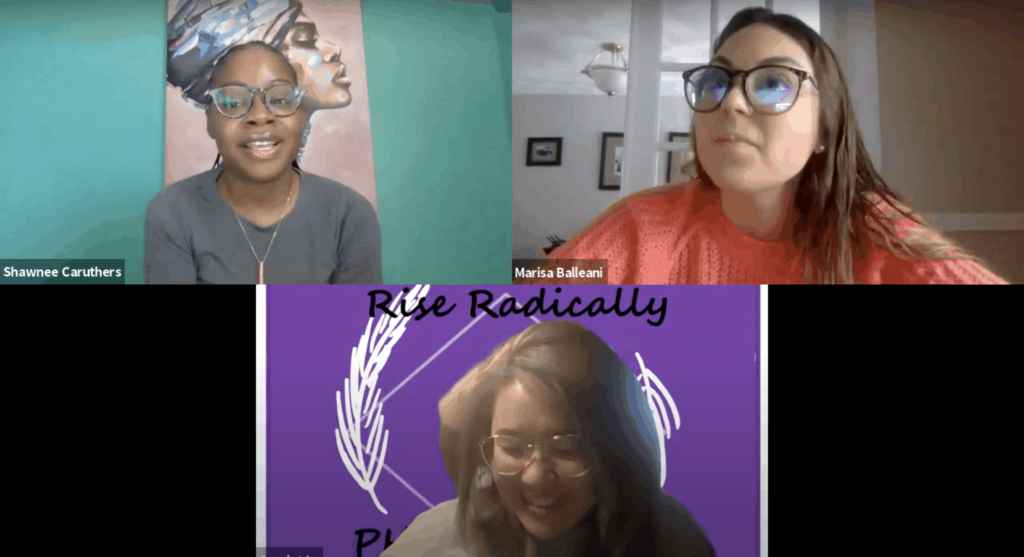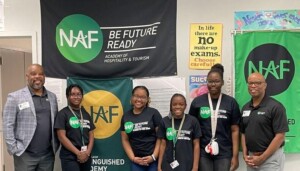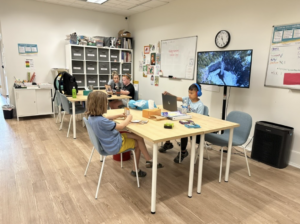Phoenix Charter Academy on The Primary Person Advisory Model

On this episode of the Getting Smart Podcast Rashawn “Shawnee” Caruthers talks with two educators from Phoenix Charter Academy about their Primary Person model, a one-on-one advisory system that puts mental health and wellness at the forefront of student progress.
Phoenix Charter Academy is a member of The Learning Accelerator’s Strategy Lab Cohort. As storytelling partners on the project, we are thrilled to share this vital work that helps districts work together to accelerate the development of a more resilient and equitable education future.
Scarlet Im and Marisa Balleani are two Phoenix Charter Academy educators who joined us for this episode. Scarlet is a Mathematics Teacher and Marisa is an Academic Support Teacher and Case Manager. These two educators were chosen due to their dedication and willingness to learn and iterate for the benefit of the scholars. Towards the end of the episode, we get to listen in on one of these conversations, a one-on-one check-in between Scarlet and one of her scholars.
The Primary Person Model
While the Primary Person model is not new to Phoenix Charter Academy, having started at one of their locations before the pandemic, COVID-19 and remote learning accelerated adoption at two of the other campuses, Scarlet’s campus (in Springfield, MA) and Marisa’s campus (in Chelsea, MA). Many of these practices were learned in observing Bronx Arena and U School. The Phoenix Charter Academy team took trips to observe which SEL practices were working well at these schools and brought back the principles that they thought would most apply to the students.
Then, to further create an effective SEL plan, the team put together an instructional task force consisting of state-wide team representation, teachers, social workers, special education teachers and more to identify growth and challenge areas and relay the information back to families and students to get their input. The various stakeholders on the task force served as messengers to ensure all voices were at the table.
In a conversation with the Chief Schools Officer of Phoenix Charter Academy, Dixie Bacallao, she stated that “One key area where our SEL curriculum differs from many other programs is we don’t put a big emphasis on persistence and resilience. Many of our students demonstrate those skills just by showing up, they are some of the most resilient people I’ve ever met, already […] There’s room for growth but we’ve had an upwards of 80% rate with getting students to participate in these meetings.”
Throughout the podcast, Scarlet and Marisa reflected multiple times that it is essential for students to have at least one adult in the “building” that they can trust, that they can turn to if things get difficult. They’ve also begun implementing a lesson every other week to help learners understand foundations in SEL skills and to practice confidence/competence in the following areas: social awareness, health/wellness, challenges/obstacles and goals/scheduling.
In practice, the primary person model looks like frequent check-ins over text, consistency with meeting cadence (typically three times per week), a focus on individual learner goals and an established instructional coaching model to keep the primary people learning and growing.
Listen to the episode to find out more about the practice, whether it’s scalable and to hear what learners think of this model.
Key Takeaways:
[:11] About today’s episode with Scarlet Im and Marisa Balleani of Phoenix Charter Academy.
[1:18] Rashawn Caruthers welcomes Scarlet and Marisa to the podcast.
[1:31] Scarlet shares her background and gives an introduction to the Phoenix Charter Academy.
[2:56] Marisa speaks about her role at Phoenix Charter Academy.
[3:42] About the Primary Person Model and how it originally began.
[5:36] How Marisa has witnessed the Primary Person Model create a shift for students.
[7:09] Key findings that Scarlet is seeing from these one-on-one meetings with students and
educators.
[9:19] Marisa shares her personal experience with her PPM caseload and the benefits she is seeing
amongst students.
[10:06] How are they collecting data from the PPM program to continue to build the program post-
COVID-19 and in different reflective practices?
[11:35] Scarlet shares how they have used professional development to support the PPM work
within their school.
[14:21] Marisa shares how they use the data they collect to shift their teaching practices and their
level of support for one another.
[15:55] Is the PPM model scalable? Can other schools utilize it?
[19:38] What would students say about the PPM model? What do they like most about it?
[21:44] A special check-in between Scarlet and one of her scholars where they go over his weekly
schedule, upcoming goals, and more!
[32:46] Rashawn thanks Scarlet and Marisa for joining the podcast!
Mentioned in This Episode:








0 Comments
Leave a Comment
Your email address will not be published. All fields are required.